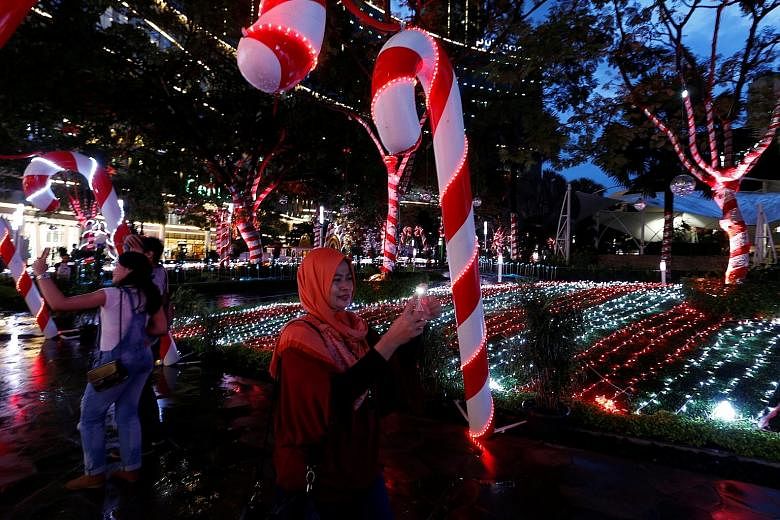As staff at St Paul's Church in central Jakarta set out dozens of rattan chairs, sweets and platoons of bowls that will be used for noodles at a birthday party for one of the congregants that evening, Ms Pinky Rosalie Margaret thought about the preparations to mark a more auspicious birthday today.
Starting at about 7pm on Christmas Eve, the 82-year-old Protestant house of worship, which weathered the Japanese Occupation, will host services for 6,000 congregants staggered over three sessions.
Representatives from Jakarta's local government will attend. On hand, too, will be metal detectors as well as 70 police officers to ensure security.
"It will be crowded. You don't know what will happen," said Ms Margaret, the church's newly appointed administrator. "It's a lot of work."
Historically among Indonesia's more tolerant cities, Jakarta has a new normal as the scene at St Paul's reflects, following a bitter election this year that pitted a Muslim backed by Muslim hardliners and a Christian incumbent.
Gone for now are the mass rallies of the hardliners, but some remain wary.
"Things aren't any worse," said Ms Chrestela Tan, a congregant at nearby Theresia Catholic Church in the leafy neighbourhood of Menteng. "But can we say they are getting better? I don't know."
Mr Anies Baswedan coasted to a landslide victory after two rounds of voting in the gubernatorial election, ousting Basuki Tjahaja Purnama, a Christian of Chinese descent. A month after the poll ended, in early May, Basuki, who is better known as Ahok, was jailed for insulting Islam.
Bitterness and resentment linger as the year draws to a close. To help heal the divisions, the capital's new governor offered the use of the National Monument for a Christmas event.
But the offer was controversial. Known as Monas, it was the staging ground for the three mass rallies last year that were aimed in part at convincing Muslims to not vote for non-Muslims.
After three meetings between the Indonesian Communion of Churches (PGI) and representatives of the city government, the Christian group declined the offer.
"It was too political," PGI's spokesman Jerry Sumampouw said of the offer. "The Ahok case made us very afraid. Things are better now, but the radicals will reappear at the next election."
The Setara Institute, a human rights research outfit, has ranked Jakarta as the country's most intolerant city, because of the unease linked to the recent election. The group in February also noted that acts of religious intolerance nationwide swelled to 270 last year, up from 236 a year earlier.
With intolerance on the rise, Indonesia's broadly secular approach to government risks becoming polarised thanks to religion, said Setara Institute's deputy chairman Bonar Tigor Naipospos.
"There was deep trauma this year and that is hard to erase," he said. "The Islamisation of politics is now the way to get power and influence."
As Indonesia becomes increasingly conservative, its approach to Christmas verges on the schizophrenic. Officially, Muslims have been cautioned against saying "Merry Christmas" or celebrating the festival. But the fatwa, issued in 1981, is not binding and is heeded only sporadically.
Hardliners, though, have taken up the fight with increasing gusto in recent years.
In the run-up to Christmas last year, vigilante groups, such as the Islamic Defenders Front, stormed seven shopping malls in Surabaya, the country's second-largest city, on the lookout for Muslims wearing Santa hats and other infractions.
To be sure, it is hard to escape Christmas here. In a country where 87 per cent of its citizens are Muslim, the shopping malls of its capital are festooned with decorations. Gaudy renditions of Christmas carols play, as women in hijab sip hot drinks out of paper cups emblazoned with Christmas motifs at Starbucks.
Across the street from St Paul's, Mr Kyai H. Mulyadi, one of the leaders at the Sunda Kelapa Mosque, says the faithful there enjoy warm relations with their Christian neighbour. As he readied for evening prayers, Mr Mulyadi said the mosque will open its parking to congregants attempting to squeeze into St Paul's today. St Paul's said they return the favour for Muslim holidays.
For Mr Mulyadi, the inter-faith rancour of this year and last is in the past. "We have a Muslim government that will take care of everyone. Muslims have chosen a Muslim leader just as Christians can choose a Christian leader," he said.
"Things are not only getting better, our troubles are resolved."
•Additional reporting by Imam Shofwan

